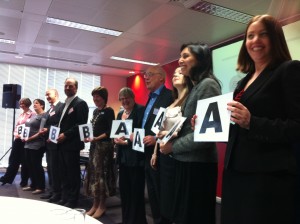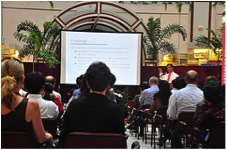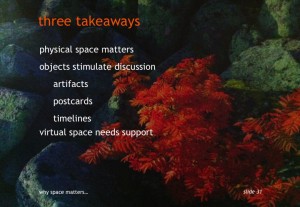This extract from today’s twitter stream on KM Legal 2014 is telling:
Just been asked why we’re not at
#KMLegal in London – “because we went to the one in 2004” was the answer.
I was there to deliver the opening address to this year’s KM Legal event. It was very well attended with 80% of the audience being qualified lawyers.
In truth I left feeling disappointed. Apart from an interesting perspective on the future role of predictive data delivered by Eric Hunter, Director of Knowledge, Bradford & Barthell in California much of the remainder focused on providing information rather than applying knowledge and the discussion was about Intranet implementations on SharePoint. I should point out that my impressions are based only on Day One.
In my presentation (publically available on SlideShare) I began by describing how 20 years ago I’d helped build a one screen view of all our activity and created what was effectively one of the first Intranets in the process. Yes the solutions and reach are greater today but the questions being addressed are the same.
Its significant how many people have knowledge in their titles however almost all are involved in Operational Knowledge Management and many in Information Management. Very few appeared to be involved in Strategic Knowledge Management which for me is surprising given that the legal profession more than many others has to be knowledge driven relying on precedent and changing judgements in order to make recommendations (legal arguments) based on personal and team knowledge and experience.
Information Management is not Knowledge Management!
Mark Gould (who was suitably voluble) summed it up thus:
Information management is important, and often needs to be better. Helping information flow is not knowledge management.
I noted the Knowledge Management definition delivered by Zurich which might work for them and meet their specific criteria but for me misses by a mile the real meaning of Knowledge Management:
Knowledge Management: ‘The efficient and effective use of information to meet the objectives of the team and businesses we support’
Where is the key bit about learning from what you’ve done before, capturing, storing and reusing the knowledge of people? What happens when people leave and new lawyers join? Yes Knowledge Management requires good information systems to support it but there is no mention of building knowledge into the processes of the business. Its quite ironic as in 1998 Zurich Re London hired me to help embed knowledge into their Lotus Notes systems for underwriting and decision making.
We want value add from our legal parners!
This was a cry from a few of the presenters and the logic is powerful. If their lawyers have expertise in managing knowledge then why not tap into it and ask them to share it with the clients as part of an overall package. But that’s a narrow perspective as the conference demonstrated. The essence of KM tools like Peer Assists is that you are bringing expertise from outside of your own industry when launching a new project. Organisations that just hire the same character types and draw from the same talent pool end up being clones! The same applies to advice.
Transparency and co-creation
Eric’s presentation struck a chord. His premise: that the future is about opening up and co-creating with clients is spot on. Clients at the event were complaining about opaque charging structures and archaic processes. Eric (who is ex Oracle) noted that:
Real-time data analytics is changing business models
I buy into that argument and can see a world where more generic aspects of law are consolidated (perhaps in the cloud) and the superior knowledge hence value is priced differently. Surely the value of great legal minds is in the analysis and delivery not the curation and storage?
Comments I liked:
- On Intranets: Bird&Bird-content facilitation role vital to look at what was best version and then use that. Linklaters–When search works you are on your way to a winning Intranet!
- On how to sell: White&Case- Demands for collaboration coming from clients is a common theme. Love analogy of selling processing and successful completion.
- On the creation of embedding knowledge into ‘Pathways’ (processes): White&Case– Subject matter pathways (a set of navigable PowerPoints) that help lawyers go thru a workflow. simplicity thru PowerPoint with embedded live links. Real business efficiency tool. pathway dependent on effective curation next step is to add on time recording and budgeting. Good for showing clients Gr8 for onboarding.
- On what’s in it for me: White&Case– people will only contribute if they know who is going to see information. Simplicity is best, fewer options better.
- On what people are called: Zurich– Expertise Enablement Officer, (Learning Officer, Knowledge Manager, Information Manager rolled into one).
- On organisational values and change: Berwin LeightonPaisner– Downside of giving people ability to customise their personal home pages is that the core message / values of the firm get lost.Lewis Silken– Powerful group needed to bring about change in a legal firm? Secretaries! Administrative initiatives will fail if not involved.
- On the future: Various– revolution in way of working is coming with a need for a virtual digital workspace across the industry that all firms contribute to. Increasingly clients will put together teams based on the best practitioners drawn from different firms.
What I missed?
- Any discussion around communities and talk of knowledge sharing policies.
- A discussion on risk – none seemed to follow the example of Nuclear who have identified what critical knowledge is and tried to plan accordingly for its loss?
- And a wide ranging debate on Twitter that brought those outside the room into it. How can we as a KM Community preach knowledge sharing if when we are at events like this we don’t practice it?
And finally:
I left feeling that the huge challenge of breaking down silos across specialist practices in law firms has yet to be tackled effectively. Yes the idea of common platforms is a good one but each practice area is a federated business and lawyers probably have more allegiance to their specialism than a firm.
‘What you bill is who you are’ came across as a strong undercurrent that can only be overcome by the sort of technological changes that impacted the Reinsurance Industry when Catastrophe Modelling Analytics went from being nice to haves to must haves in order to stay in the game.
If you accept the premise that the future is about co-creation and collaboration then the centralised firm structure is in danger as technology aids disintermediation. This suggests Legal Knowledge Management’s future focus should be on competencies, skills and network management.
And just to prove that the legal profession has embraced ‘Gamification’







